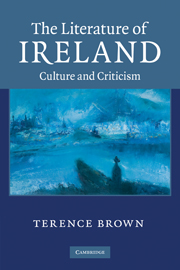Book contents
- Frontmatter
- Contents
- Acknowledgements
- Introduction
- 1 The Literary Revival: historical perspectives
- 2 Joyce's magic lantern
- 3 Music: the cultural issue
- 4 Modernism and revolution: rereading Yeats's ‘Easter 1916’
- 5 Shakespeare and the Irish self
- 6 Irish literature and the Great War
- 7 Ireland, Modernism and the 1930s
- 8 Post-modernists: Samuel Beckett and Flann O'Brien
- 9 Patrick Kavanagh: religious poet
- 10 MacNeice's Irelands: MacNeice's islands
- 11 Louis MacNeice and the Second World War
- 12 MacNeice and the puritan tradition
- 13 John Hewitt and memory: a reflection
- 14 Michael Longley and the Irish poetic tradition
- 15 Seamus Heaney: the witnessing eye and the speaking tongue
- 16 Derek Mahon: the poet and painting
- 17 Telling tales: Kennelly's Cromwell and Muldoon's ‘The More a Man Has the More a Man Wants’
- 18 Redeeming the time: John McGahern and John Banville
- 19 ‘Have we a context?’: transition, self and society in the theatre of Brian Friel
- 20 Hubert Butler and nationalism
- 21 The Irish Dylan Thomas: versions and influences
- Index
- References
3 - Music: the cultural issue
Published online by Cambridge University Press: 05 June 2012
- Frontmatter
- Contents
- Acknowledgements
- Introduction
- 1 The Literary Revival: historical perspectives
- 2 Joyce's magic lantern
- 3 Music: the cultural issue
- 4 Modernism and revolution: rereading Yeats's ‘Easter 1916’
- 5 Shakespeare and the Irish self
- 6 Irish literature and the Great War
- 7 Ireland, Modernism and the 1930s
- 8 Post-modernists: Samuel Beckett and Flann O'Brien
- 9 Patrick Kavanagh: religious poet
- 10 MacNeice's Irelands: MacNeice's islands
- 11 Louis MacNeice and the Second World War
- 12 MacNeice and the puritan tradition
- 13 John Hewitt and memory: a reflection
- 14 Michael Longley and the Irish poetic tradition
- 15 Seamus Heaney: the witnessing eye and the speaking tongue
- 16 Derek Mahon: the poet and painting
- 17 Telling tales: Kennelly's Cromwell and Muldoon's ‘The More a Man Has the More a Man Wants’
- 18 Redeeming the time: John McGahern and John Banville
- 19 ‘Have we a context?’: transition, self and society in the theatre of Brian Friel
- 20 Hubert Butler and nationalism
- 21 The Irish Dylan Thomas: versions and influences
- Index
- References
Summary
In ‘The Dead’, James Joyce's wonderfully composed short story, the musical world of turn-of-the-century Dublin is evoked with the author's characteristically exacting sense of social and cultural detail. Music is a principal topic of conversation at the Misses Morkans' annual Christmas soirée for their friends and pupils at the music school they run together, and it plays a crucial part in the meaning of the tale itself. As well it might in Edwardian Dublin, where a musical career was one of the few open to a respectable unmarried woman.
Gabriel Conroy, the Misses Morkans' nephew, is to give the after-dinner speech at this culinary and musical feast at his aunts' rented home in Usher's Island. He judges that his audience would respond most enthusiastically not to a quotation from the ‘difficult’ Victorian poet Robert Browning, but to something they would recognise, ‘some quotation from Shakespeare or from the Melodies’. As a soi-disant intellectual, he fears that the culture of his aunts and their friends and pupils is essentially middle-brow and conventional. He knows that the Irish Melodies of Thomas Moore are wholly familiar to them and vested with the same unexceptionable respectability that the Victorian and Edwardian middle classes, even in Ireland, curiously allowed the Bard of Avon.
- Type
- Chapter
- Information
- The Literature of IrelandCulture and Criticism, pp. 36 - 44Publisher: Cambridge University PressPrint publication year: 2010



